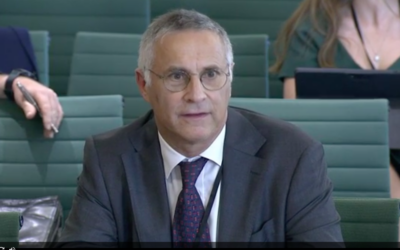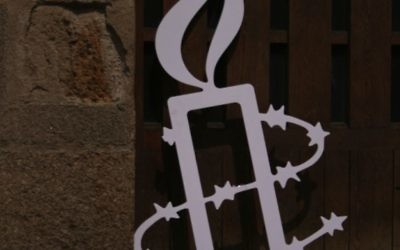Pro-Israel lawyer tells MPs it’s ‘sloppy thinking’ to speak of ‘illegal’ settlements in the West Bank
Jonathan Turner KC, CEO of UK Lawyers for Israel, was giving evidence to a parliamentary committee scrutinising the government's anti-Israel boycott legislation
Lee Harpin is the Jewish News's political editor
The barrister Jonathan Turner has told a Westminster parliamentary committee that he does not accept that Israel is engaged in an “illegal” occupation of the Palestinian territories.
Appearing as a witness as a committee of MPs scrutinised the government’s anti-boycott legislation that would impose fines on public bodies, including local councils, that seek to mount boycotts against Israel, the chief executive of the UK Lawyers For Israel group also said it was “sloppy thinking” to talk of illegal settlements in the West Bank.
Responding to a question as to whether the proposed legislation as it is currently drafted “effective condones illegal occupation, Turner told the committee: “First of all I don’t accept that it’s an illegal occupation.
“Many international lawyers will say the settlements are illegal, but this is based on article 49, (6) of the fourth Geneva Convention, which prohibits a state, an occupying power, transferring parties, its population into occupied territory.
“But conducting a business is not transferring population. .. Running a business is not transferring people.”

Turner continued: “It’s sloppy thinking to say that the settlements are illegal so therefore companies operating in the vicinity of settlements.. it’s sloppy thinking to say operating the factory, or buying the goods are illegal under international law.”
Also arguing in support of the government’s Economic Activity of Public Bodies (Overseas Matters) Bill, which passed its second reading in July, was the journalist Melanie Phillips.
She told the committee how “British Jews get it in the neck” every time there is a presentation of Israel as a “unique evil.”
Phillips said “many people do not understand” the connection between Jewish religious identity is “wrapped up with the land of Israel” and that the BDS movement which she said “singled out” Israel must have an impact on the community.
At one stage in the hearing the MP Wayne David, who stressed his own opposition to the BDS movement, confirmed he was an avid reader of Phillips newspaper column in The Times.
She thanked him for the praise, and laughed, adding: “Flattery will get you everywhere.”
Phillips also backed claims that BDS “really hurts the Palestinian Arabs” working for companies run by Israelis in the West Bank.
Also appearing in front of the committee was the KC Richard Hermer, whose legal advice had been used by Labour to criticise the bill as it was tabled in parliament.
He told the committee the bill contained a clause that was “incompatible” with the human rights acts, because of the restrictions it placed on public bodies.
Responding to a question put to him by the MP Nicola Richards about the protection given only to Israel in the bill against the use of BDS.
Hermer said: “Undoubtably the BDS movement focuses on Israel, but often human rights campaigns focus on individual countries because its often individual countries committing human right abuses.
“So I don’t feel from a legal perspective and from a human right perspective o there is need for additional protected status, although the more so with occupied territories and the distinction drawn with the OPT. That I find on all sorts of levels very hard to understand.”

Meanwhile, Amnesty International UK’s programme director told that committee that human rights campaigners are being “delegitimised and stigmatised” with the charge of “racism and antisemitism” for standing up for Palestinian rights and criticising Israel.
Peter Frankental argued there is “no reason in principle” why any advocate should not criticise the human rights record of the state of Israel adding “and they should not be tarred with a brush or racism and antisemitism. That’s a very dangerous road to be going by.”
Economic affairs director Frankental said he feared that if these attacks on human rights campaigners progressed, those criticising human rights violations of the Rohingya in Myanmar risked being accused of being “anti-Buddhist” while those who condemned violations by the Indian government would become anti-Hindu.
The Amnesty official claimed his organisation took no position over BDS but “support the right of people to advocate” for the movement.
He gave evidence to the public bill committee alongside Yasmine Ahmed, the UK director of Human Rights Watch, and Friends of the Earth’s Dave Timms, the organisation’s head of political affairs.
Ahmed told the committee that she had been engaging with Jewish organisations who “don’t want our name” associated with the bill.
She said they had told her this was “because we are saying that antisemitism is linked to the crimes and abuses that have been committed by Israel.”
Ahmed added:”It is very, very clear that there is a problem with antisemitism in this country, you just have to look at the statistics.
“But the way the government should be approaching that is looking at how they do that through the equalities duty, through education, speaking to communities.
“Not creating a law that’s going to create many more problems.”
The committee heard from a succession of witnesses this week, including representatives from the Board of Deputies, Jewish Leadership Council and Yachad.

Thank you for helping to make Jewish News the leading source of news and opinion for the UK Jewish community. Today we're asking for your invaluable help to continue putting our community first in everything we do.
For as little as £5 a month you can help sustain the vital work we do in celebrating and standing up for Jewish life in Britain.
Jewish News holds our community together and keeps us connected. Like a synagogue, it’s where people turn to feel part of something bigger. It also proudly shows the rest of Britain the vibrancy and rich culture of modern Jewish life.
You can make a quick and easy one-off or monthly contribution of £5, £10, £20 or any other sum you’re comfortable with.
100% of your donation will help us continue celebrating our community, in all its dynamic diversity...
Engaging
Being a community platform means so much more than producing a newspaper and website. One of our proudest roles is media partnering with our invaluable charities to amplify the outstanding work they do to help us all.
Celebrating
There’s no shortage of oys in the world but Jewish News takes every opportunity to celebrate the joys too, through projects like Night of Heroes, 40 Under 40 and other compelling countdowns that make the community kvell with pride.
Pioneering
In the first collaboration between media outlets from different faiths, Jewish News worked with British Muslim TV and Church Times to produce a list of young activists leading the way on interfaith understanding.
Campaigning
Royal Mail issued a stamp honouring Holocaust hero Sir Nicholas Winton after a Jewish News campaign attracted more than 100,000 backers. Jewish Newsalso produces special editions of the paper highlighting pressing issues including mental health and Holocaust remembrance.
Easy access
In an age when news is readily accessible, Jewish News provides high-quality content free online and offline, removing any financial barriers to connecting people.
Voice of our community to wider society
The Jewish News team regularly appears on TV, radio and on the pages of the national press to comment on stories about the Jewish community. Easy access to the paper on the streets of London also means Jewish News provides an invaluable window into the community for the country at large.
We hope you agree all this is worth preserving.






















